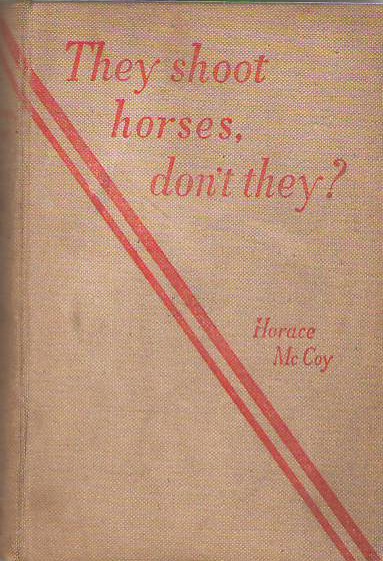Inspiring Older Readers
 posted on 13 May 2019
posted on 13 May 2019
They shoot horses, don’t they? by Horace McCoy
McCoy’s 1935 novel isn’t long but manages to capture the degradation and despair of those caught up in both the poverty of the Great Depression in the USA and the demeaning experiences of those seeking and failing to find their big break in Hollywood movies.
McCoy worked briefly as a bouncer on Santa Monica pier while he too was trying to make it big in the movies and it was this experience that gave him the inspiration for his classic work of fiction that focuses on participants taking part in a dance marathon. Dance marathons became popular as an entertainment in the Depression years because they not only offered a prize to the winning couple but all the contestants were given food, shelter and medical support for as long as the events lasted. The rules of the marathon varied from venue to venue but were all built around a similar set of expectations – that participants would not be allowed to sleep, would have to keep moving in some way or another while on the dance floor and would, periodically, be forced into a competitive event that would produce a losing couple who would be eliminated.
What really marks this book out as different is the structure McCoy chooses to use. Told in the first person by Robert Syverten, we know from the very outset that it’s a story that ends in a murder of sorts. The narrative takes place as the judge is passing his sentence on Syverten for the shooting of Gloria – and we also know that he did it and doesn’t contest the sentence of capital punishment that awaits him. We even know in the first chapter how he did it:
“I stood up. For a moment I saw Gloria again sitting on that bench on the pier. The bullet had struck her in the side of the head; the blood had not even started to flow. The flash from the pistol still lighted her face. Everything was as plain as day. She was completely relaxed and completely comfortable … I did not have a perfect profile view but I could see enough of her face and her lips to know she was smiling.”
What we don’t know is why he did it and why Gloria seems to be so compliant in the act. That is the story we get in the novel which takes place over a relatively short time period from the casual meeting between Robert and Gloria, to their entry in the competition through to the end of the marathon and Robert’s shooting of his partner.
The dance hall McCoy creates for us, in which all the action takes place, is, symbolically, a place where the sun never penetrates and fresh air is hard to find. Couples build relationships and animosities as the dance progresses and the underpinning competition between them all is clearly a comment by the author on the nature of the society that has produced these horrific spectacles. Robert clings to the hope that participation in the event will get him noticed by some big-wig in the film industry (he wants to be a film Director) and Gloria too has aspirations to become a film-star (although Robert knows she never will be – she is too old and not glamorous enough). Robert clings to his dream but Gloria soon loses hope and becomes more and more depressed – constantly wishing she had the courage to commit suicide and leave all the suffering behind her.
The intensity of the closed-room environment, the small twists and turns of events as couple move up and down the pecking order is compelling. There is intense rivalry for patrons or advertisers to select a couple for sponsorship or to offer spot prizes and this adds to the pressure-cooker intensity on the dance floor. The introduction of a dance ’derby’ in which contestants have to drag themselves round and round a course marked out on the floor is a malicious torture much loved by the crowd that takes on an almost Roman amphitheatre feel to it.
Ultimately, the marathon is never concluded. The organiser comes under pressure from moral crusaders who claim the contest is just a front for all sorts of terrible goings-on and when a punter is shot on the premises he knows the game is up and offers to split the prize money equally between those left standing. Robert and Gloria come away with just $50 as a reward for all the suffering and humiliation they’ve been through.
But how do we get from this to a situation where Robert is prepared to not just take Gloria’s life but sacrifice his own? At the end of the book, as the final sentence on him is declared by the judge, Robert says that his preparedness to shoot Gloria in the head was because he was ‘her only friend’ and that he’d come to realise she “certainly would have been better off dead.” I think what McCoy is trying to explore is the same moment of fundamental, existential doubt as that experienced by Meursault in Albert Camus’ L’Étranger . Whether he pulls the trigger or not is immaterial to his circumstances.
But McCoy is no Albert Camus and ultimately the end feels a little false and contrived – fundamentally unbelievable in the context of what went before. The notion that human life has become as insignificant as that of an animal – whether we take that life or not is just a matter of convenience or mercy – is the final lesson we are being offered here. After all, as Robert says to the policeman puzzled by his actions in the final line of the book:
“ They shoot horses, don’t they?”
Terry Potter
May 2019
The UK Hardback edition: